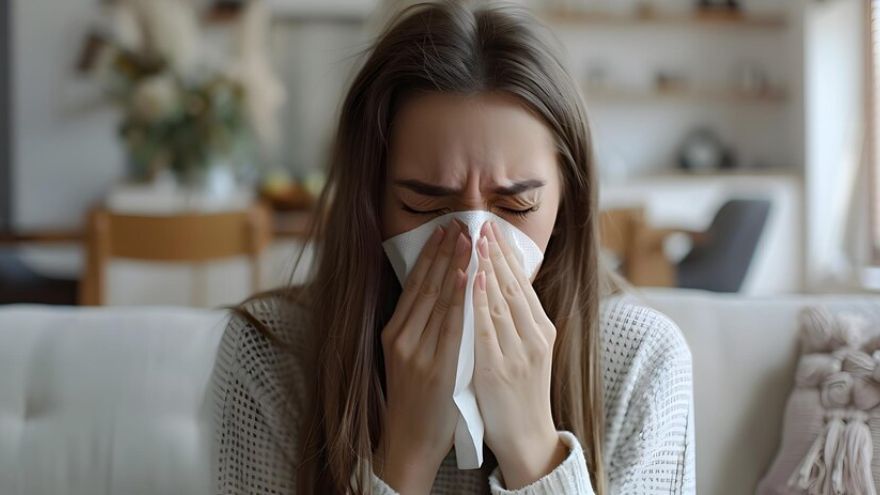
We've all been there—waking up to that annoying tickle in your nose, a stuffy feeling that just won’t go away, and an unending need to blow your nose. Yes, we're talking about the sniffles! They can be a minor annoyance or a sign of something more serious. In this comprehensive guide, we’ll explore everything you need to know about the sniffles: what they are, why we get them, how to prevent them, and what you can do to find relief. We'll also address some frequently asked questions to help you better understand and manage this common symptom.
What Are Sniffles?
The term "sniffles" generally refers to a mild nasal congestion or runny nose. You might hear people use it to describe the early signs of a cold, allergy symptoms, or even a response to chilly weather. The sniffles occur when the tissues and blood vessels in the nose become swollen with excess fluid, causing a stuffy or runny nose. While sniffles are usually more of an inconvenience than a serious health issue, they can still make you feel miserable and affect your daily life.
Common Causes of Sniffles
1. The Common Cold
The most frequent cause of sniffles is the common cold, which is a viral infection of the upper respiratory tract. The common cold is caused by a variety of viruses, with rhinoviruses being the most prevalent. Symptoms of a cold typically include a runny or stuffy nose, sneezing, sore throat, and sometimes a mild cough. These symptoms usually appear gradually and can last for about a week to ten days. While the common cold is typically mild, it can still leave you feeling pretty under the weather.
2. Allergies
Allergic reactions are another major cause of sniffles. Allergic rhinitis, often known as hay fever, occurs when your immune system overreacts to harmless substances like pollen, dust mites, pet dander, or mold. These allergens trigger the release of histamines in the body, which cause symptoms such as a runny nose, sneezing, itching, and watery eyes. Allergies can be seasonal (pollen from trees, grasses, and weeds) or perennial (dust mites, pet dander, or mold), meaning they can occur year-round.
3. Sinusitis
Sinusitis, or a sinus infection, is inflammation of the sinuses, which are air-filled spaces within the bones surrounding the nose. Sinusitis can be caused by viruses, bacteria, or fungi. When the sinuses become blocked with fluid and infected, they can cause symptoms like facial pain, pressure, nasal congestion, a runny nose, and thick, discolored mucus. Acute sinusitis usually lasts for a few weeks, while chronic sinusitis can persist for more than three months and may require medical treatment.
4. Flu (Influenza)
The flu, caused by the influenza virus, can also lead to sniffles. Unlike the common cold, the flu typically comes on suddenly and can cause more severe symptoms, including high fever, body aches, fatigue, headache, and cough. Sniffles may be a part of the flu symptom package, but they are usually accompanied by more significant respiratory distress and systemic symptoms.
5. Non-Allergic Rhinitis
Non-allergic rhinitis is characterized by chronic sneezing or a congested, runny nose with no apparent cause. Unlike allergic rhinitis, this condition is not triggered by allergens. It can be caused by irritants such as smoke, strong odors, pollution, changes in weather, or even spicy foods. Some people also experience non-allergic rhinitis due to hormonal changes, certain medications, or structural problems in the nose.
6. Environmental Factors
Environmental factors like cold, dry air or exposure to irritants such as cigarette smoke and pollution can also cause sniffles. In these cases, the nasal passages can become dry and irritated, prompting the body to produce more mucus as a protective response.
7. Hormonal Changes
Changes in hormone levels, particularly during pregnancy or menopause, can lead to nasal congestion and sniffles. Pregnancy rhinitis is a common condition that can cause a stuffy or runny nose due to increased blood flow and hormonal changes that affect the nasal passages.
How to Prevent Sniffles
While you can’t always avoid the causes of sniffles, there are several strategies you can employ to reduce your risk and protect your nasal health.
1. Practice Good Hygiene
Good hygiene is key to preventing many of the viruses that cause sniffles. Regular hand washing with soap and water can help prevent the spread of germs. Avoid touching your face, especially your nose and mouth, to minimize the risk of infection. It’s also a good idea to carry hand sanitizer for situations when soap and water aren’t available.
2. Avoid Allergens
If you know you have allergies, try to minimize your exposure to allergens. Keep windows closed during high pollen seasons, use air purifiers, and clean your home regularly to reduce dust and pet dander. Wearing a mask during outdoor activities can also help limit your exposure to pollen and other allergens.
3. Stay Hydrated
Drinking plenty of fluids helps keep the mucous membranes in your nose moist, which can prevent irritation and reduce the likelihood of congestion. Staying hydrated is also essential for overall health and can help your immune system function optimally.
4. Use a Humidifier
Using a humidifier in your home can help maintain optimal humidity levels, especially during the winter months when indoor heating systems can dry out the air. Keeping the air moist can prevent your nasal passages from becoming dry and irritated, reducing the risk of sniffles.
5. Get Vaccinated
Getting an annual flu vaccine can help protect you from influenza, a common cause of sniffles. Vaccination not only helps reduce your risk of getting the flu but also lessens the severity of symptoms if you do catch it.
6. Avoid Smoking and Secondhand Smoke
Smoking and exposure to secondhand smoke can irritate the nasal passages and increase mucus production, leading to chronic sniffles. If you smoke, quitting is one of the best things you can do for your respiratory health. Avoiding places where people smoke can also help protect your nose and lungs.
7. Manage Stress
Chronic stress can weaken your immune system, making you more susceptible to infections. Engaging in regular stress-reducing activities such as exercise, meditation, and deep breathing can help keep your immune system strong and reduce the likelihood of catching a cold.
8. Eat a Healthy Diet
A balanced diet rich in fruits, vegetables, whole grains, and lean proteins can help support your immune system. Foods high in vitamins and minerals, such as vitamin C and zinc, can be particularly beneficial for maintaining nasal and overall health.
Remedies for Sniffles
If you're already dealing with sniffles, there are plenty of remedies you can try to alleviate your symptoms and get back to feeling like yourself.
1. Over-the-Counter Medications
- Antihistamines: These medications, such as cetirizine, loratadine, and diphenhydramine, are effective for treating sniffles caused by allergies. They work by blocking histamines, which are chemicals released during an allergic reaction that cause symptoms like sneezing and a runny nose.
- Decongestants: Medications like pseudoephedrine and phenylephrine help reduce nasal congestion by shrinking the blood vessels in the nasal passages. Be cautious with these, especially if you have high blood pressure, as they can increase heart rate and blood pressure.
-Nasal Sprays: Saline nasal sprays can help moisten the nasal passages and clear out mucus. Steroid nasal sprays, such as fluticasone and budesonide, reduce inflammation in the nasal passages and are effective for treating allergic rhinitis and non-allergic rhinitis.
2. Natural Remedies
-Steam Inhalation: Inhaling steam from a bowl of hot water can help loosen mucus and relieve congestion. Adding essential oils like eucalyptus or peppermint may enhance the effects, but use caution as these can sometimes irritate sensitive individuals.
-Warm Compress: Applying a warm compress to your face can help relieve sinus pressure and congestion. The warmth can soothe the nasal passages and encourage mucus drainage.
- Hydration: Drinking plenty of fluids, such as water, herbal teas, and clear broths, can help thin mucus, making it easier to expel and reducing congestion.
-Honey and Warm Beverages: Consuming warm beverages with honey can soothe a scratchy throat and provide relief from sniffles. Honey has mild antibacterial properties and can coat the throat, reducing irritation.
3. Rest and Recovery
Getting enough rest is crucial when dealing with the sniffles. Rest allows your body to heal and recover, and it gives your immune system the energy it needs to fight off infections. Make sure to get plenty of sleep and take it easy if you’re feeling under the weather.
4. Avoid Irritants
Try to avoid known irritants, such as smoke, strong perfumes, and environmental pollutants, which can worsen your symptoms. Keeping your home clean and free of allergens can also help minimize your sniffles.
Conclusion
Sniffles may seem like a minor inconvenience, but they can significantly impact your comfort and quality of life. Understanding the causes, prevention strategies, and remedies for sniffles can help you manage your symptoms more effectively and get back to feeling your best. Remember, most cases of sniffles are harmless and will pass with time, but if your symptoms persist or worsen, don't hesitate to seek medical advice. By taking proactive steps to care for your nasal health, you can minimize the impact of sniffles and breathe easier all year round.
Frequently Asked Questions About Sniffles
Q1: Can sniffles be a sign of something serious?
While sniffles are usually caused by minor issues like a cold or allergies, they can sometimes be a sign of a more serious condition. If your sniffles are accompanied by high fever, persistent facial pain, thick green or yellow nasal discharge, or last more than two weeks without improvement, it’s a good idea to see a doctor to rule out any serious underlying conditions like a sinus infection or other respiratory issues.
Q2: How can I tell if my sniffles are from allergies or a cold?
Allergies and colds can have similar symptoms, such as a runny nose, sneezing, and congestion, but there are some key differences. Allergies typically cause itching in the nose, eyes, or throat and can last as long as you’re exposed to the allergen. Colds, on the other hand, usually come on gradually and may include a sore throat, cough, and mild fever. If your symptoms are persistent and occur at specific times of the year, they’re more likely due to allergies.
Q3: Are there any home remedies that really work for sniffles?
Yes, several home remedies can provide relief from sniffles. Some of the most effective include steam inhalation, using a humidifier, staying hydrated, and applying a warm compress to the face. Consuming warm beverages with honey can also help soothe a scratchy throat. It’s important to note that while these remedies can alleviate symptoms, they won’t cure the underlying cause of the sniffles.
Q4: Can stress cause sniffles?
While stress itself doesn’t directly cause sniffles, it can weaken the immune system, making you more susceptible to infections like colds, which can lead to sniffles. Stress can also worsen allergies or non-allergic rhinitis, both of which can cause sniffles. Managing stress through relaxation techniques, exercise, and adequate rest can help support your immune system and reduce the likelihood of getting sick.
Q5: Is it safe to use nasal sprays for sniffles?
Saline nasal sprays are generally safe for everyone and can be used regularly to help keep the nasal passages moist and clear of mucus. Steroid nasal sprays are effective for reducing inflammation and are safe for most people when used as directed. Decongestant nasal sprays can provide quick relief from congestion, but they should not be used for more than three days in a row, as they can cause a rebound effect, leading to increased congestion.
Q6: Can children get sniffles too?
Yes, children can definitely get sniffles. They are often caused by the same things that cause sniffles in adults, such as colds, allergies, and environmental irritants. Children are particularly susceptible to colds because their immune systems are still developing, and they are often in close contact with other children, especially in school or daycare settings. It's important to ensure children wash their hands regularly, avoid touching their faces, and cover their mouths and noses when sneezing or coughing to prevent the spread of germs.
Q7: When should I see a doctor for my sniffles?
Most cases of sniffles don’t require a doctor’s visit and will resolve on their own with rest and self-care. However, you should consider seeing a doctor if:
- Your sniffles last longer than two weeks without improvement.
- You have a high fever, severe facial pain, or a headache.
- You notice thick green or yellow nasal discharge.
- You have a history of chronic sinus infections or other respiratory issues.



